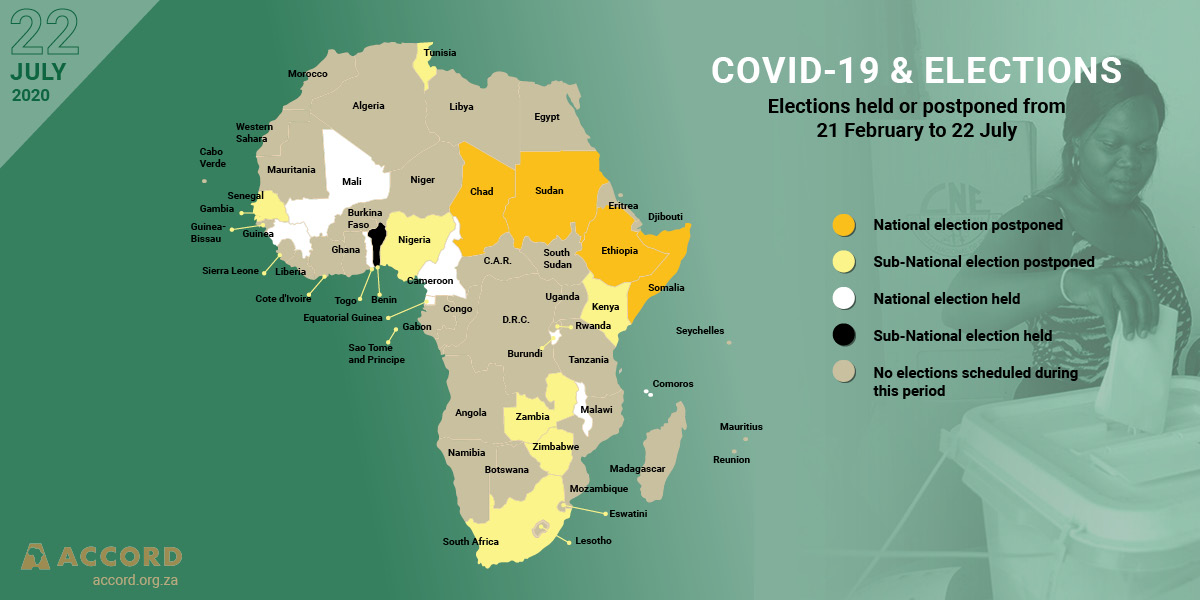The 1991 multiparty election in Benin set the tone for the transitional democratisation model on the African continent, as it departed from the post-colonial, one-party state system that was in place since the 1960s. Electoral processes are characterised by critical, time-bound and sequential features, typically set out in the constitution and electoral laws. These features range from the boundary delimitation of constituencies, candidate and voter registration, designated time frames and a set period of campaigning to conducting the actual polling, collating the results and, finally, the announcement of the result. However, in practice, elections in Africa have been characterised by conflict and violence.
When it comes to COVID-19 and elections in Africa, the choice comes down to protecting the vote or the voter @MartinRupiya #C19ConflictMonitor
Tweet
In view of the COVID-19 pandemic, several countries decided to postpone their constitutionally scheduled local government elections due to take place in 2020, including the Gambia, Kenya, Nigeria, Tunisia, Uganda, Zambia and Zimbabwe. At a national level, on 1 April the Ethiopian parliament postponed the country’s scheduled 29 August 2020 general election to prevent the spread of COVID-19. By extension, the decision also extended the term of the prime minister, Dr Abiy Ahmed – which has drawn sharp criticism from some opposition groups and has contributed to political tension in the country.
In Zimbabwe – characterised by a protracted conflict manifest in its political, economic and security fields in the midst of the COVID-19 pandemic, the government has sought to fast-track 27 constitutional amendments that “among other things, seek[s] to grant powers to a sitting President to appoint his two deputies, handpick judges for promotion to higher courts as well as increase the number of non-MP ministers he could appoint to the cabinet”. In a surprising development, the attempt to take advantage of the COVID-19 lockdown that effectively constrains the participation of the citizenry has drawn criticism from a wide variety of voices, including the ruling party’s Chair of the Parliamentary Committee, Misheck Mataranyika, who has reported deep unease and unhappiness by the public towards the process.
On 20 May 2020, Burundi hosted elections after dismissing COVID-19 warnings by the World Health Organization (WHO) and subsequently expelling its office. The ruling party candidate, Evariste Ndayishimiye, won the poll and was due to be inaugurated in August. However, three weeks after the elections, President Pierre Nkurunziza died suddenly. The president-elect was immediately installed and soon announced a shift in the country’s COVID-19 policy, declaring it as enemy number one and ordering nationwide testing and social distancing. This dramatic about-turn on the nation’s policy towards COVID-19 after elections is not unique, as the same shift occurred in Malawi.
In the case of Malawi, COVID-19 emerged in the midst of a national electoral crisis after the aborted May 2019 general election, in which the high court annulled the presidential vote and called for a rerun after the political opposition and civil society groups had successfully interdicted the result. In the interim period before the scheduled electoral rerun, any decision taken by the government, even around COVID-19, was perceived as open to contestation. For example, introducing measures to contain the spread of COVID-19, on 20 March 2020 the then-president Peter Wa Mutharika issued a decree ordering schools to close and banning gatherings of 100 people or more. Activists took the case to the high court, arguing that the government had not put adequate measures into place to provide welfare to dwellers in towns, rural areas and informal settlements.
The ongoing political crisis was now focused on who made the decisive national decisions in the country during the interim period. As a result, the courts ruled on the technical submissions, in which it was successfully argued that until the state had put adequate social welfare measures into place, the lockdown could not be implemented. In parallel, there was also a widespread lack of testing, with both the incumbent regime and the political opposition downplaying the pandemic. The opposition, in particular, embarked upon an aggressive and extensive campaign in which large crowds gathered, with people shaking hands and closely interacting in direct violation of the recommended social distancing guidelines. After the elections, a different approach was adopted by the newly elected president, Dr Lazarus Chakwera. The time to protect the voter had arrived. Just days afterwards, the new president ordered a significantly scaled-down inauguration event, held within the confines of the military barracks and to which only 100 guests were invited, in light of COVID-19 concerns.
In conclusion, when it comes to COVID-19 and elections in Africa, the choice comes down to protecting the vote or the voter.
Professor Martin Rupiya is head of Innovation and Training at ACCORD.

